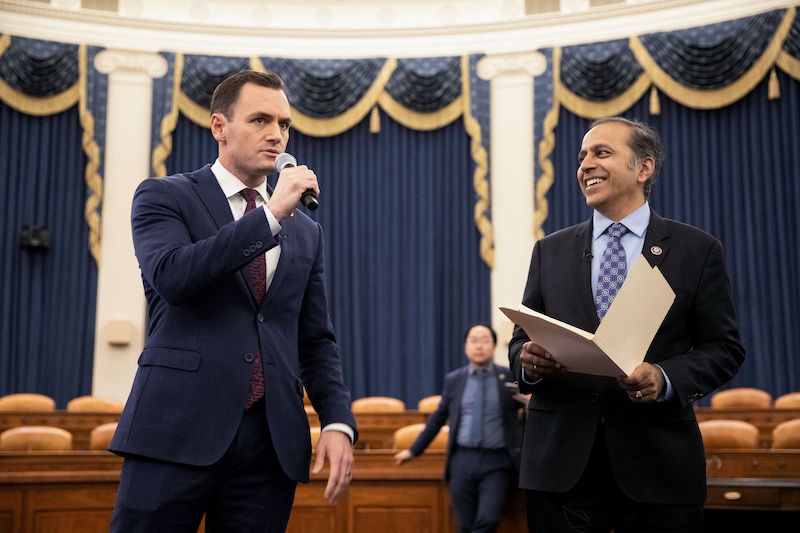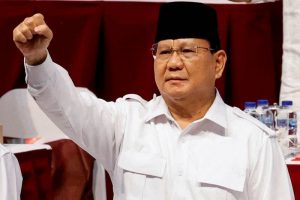A prominent US Senator says China’s Communist Party is likely to strongly support the White House move to revoke visas for Chinese students studying in the US.
Raja Krishnamoorthi, a Democrat from Illinois, who is a key figure on the House Select Committee on the Strategic Competition Between the US and the Chinese Communist Party, told a US television programme on Sunday the CCP was “cheering for this policy.”
Why? “Because they want these people back,” he told CBS’ Margaret Brennan on ‘Face the Nation’ on Sunday. “They want the scientists and the entrepreneurs and the engineers who can come and help their economy. And so we are probably helping them, as well as other countries, more than helping ourselves with this policy.”
ALSO SEE: China Denies Trump Claim, Says It Was US That Broke Trade Deal
Secretary of State Marco Rubio announced the move on Wednesday to revoke “visas of Chinese students, including those with connections to the Chinese Communist Party or studying in critical fields.”
About 277,000 Chinese students studied in the US last year and nearly 20% of highly educated tech employees in Silicon Valley come from China, according to a report by Politico, which said details of the move remain unclear.
Krishnamoorthi said heightened vetting of Chinese students made sense, particularly in critical areas, “because we know that the CCP tries to steal, for instance, intellectual property or worse. But the way that this is currently structured looks very, very suspicious.”
He feared the current approach by the Trump Administration was too broad and “prejudicial and discriminatory.”
Beijing unhappy with ‘possible war’ remarks
In other news from the weekend, China protested to the United States about Defence Secretary Pete Hegseth calling it a threat to the Indo-Pacific region.
The foreign ministry in Beijing claimed on Sunday that his comments at the Shangri-La Dialogue in Singapore on Saturday were “deplorable,” Reuters said.
“Hegseth deliberately ignored the call for peace and development by countries in the region and instead touted the Cold War mentality for bloc confrontation, vilified China with defamatory allegations, and falsely called China a ‘threat’,” the ministry said on its website.
“The United States has deployed offensive weaponry in the South China Sea and kept stoking flames and creating tensions in the Asia-Pacific, which are turning the region into a powder keg.”
China’s defence ministry also claimed that the US likes to use the annual forum to “stoke disputes, sow discord and seek selfish interests.”
Hegseth had urged allies in the Indo-Pacific region, including key security partner Australia, to spend more on defence after warning of the “real and potentially imminent” threat from China.
Asked about the call to boost defence spending, Australian Prime Minister Anthony Albanese said his government had pledged an extra A$10 billion ($6 billion) to defence.
“What we’ll do is we’ll determine our defence policy,” he told reporters on Sunday, a transcript of his remarks showed.
As part of Washington’s longstanding defence ties with the Philippines, the US military this year deployed Typhon launchers that can fire missiles to hit targets in both China and Russia from Luzon, the main island.
‘Goodwill and restraint’
China and the Philippines contest sovereignty over some islands and atolls in the South China Sea, with growing maritime run-ins between their coast guards as both vie to patrol the waters.
China’s delegation at the forum said “external intervention” was the biggest risk for stability in the South China Sea, saying the country had shown “goodwill and restraint” through talks on the issue.
The United States, Australia, Japan and the Philippines have conducted joint maritime operations in the busy waterway.
China claims nearly all the South China Sea, including parts of the exclusive economic zones of Brunei, Indonesia, Malaysia, the Philippines and Vietnam.
In 2016, an international arbitration tribunal ruled Beijing’s expansive claim had no basis in international law, however.
China’s foreign ministry also told the United States not to “play with fire” on the question of Taiwan.
Any attempt by China to conquer Taiwan “would result in devastating consequences”, Hegseth said in his speech to Asia’s premier forum for defence leaders, military officials and diplomats.
China has vowed to “reunify” with the separately governed island, by force if necessary. Taiwan’s government rejects Beijing’s sovereignty claims, saying only the island’s people can decide their future.
- Jim Pollard with Reuters
ALSO SEE:
Hong Kong College Offers to Take Harvard Students
Trump’s Tariffs Reinstated as Appeals Court Pauses Trade Ruling
Shipments of US Ethane to China Face Export Licence Uncertainty
US Blocks Chip Design Software, Chemical Shipments to China
Nvidia ‘Plans Low-Cost Blackwell AI Chip For China’ After US Curbs
Beijing Says Latest US Chip Warning Puts Trade Truce at Risk
Mass Layoffs Avoided in China, But Export Sector Badly Shaken
Asian Markets Rise After US, China Agree to Cut Majority of Tariffs
























